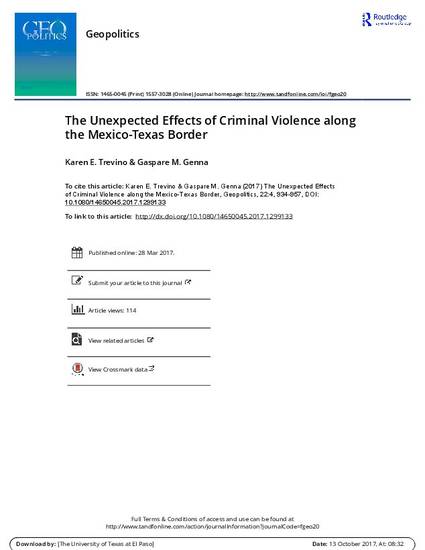
Article
The Unexpected Effects of Criminal Violence along the Mexico-Texas Border
Geopolitics
(2017)
Abstract
The violence and insecurity that Mexico suffered during former
President Calderon’s war on the Mexican drug cartels have
come at a grave economic cost to many cities. The criminal
violence had an impact on interdependent borderlands, which
are geographic areas that have a symbiotic link between cities
and communities of adjoining territories. Mexican business
people and consumers that live in cities along the shared
border with the United States have the ability to shift their
economic transactions away from their insecure environments
and to US border communities. In addition, US residents that
would normally travel south for economic transactions would
decide to avoid violent areas and therefore conduct business
on the northern side. This research demonstrates that
increased violence in Mexico produced a positive economic
effect on the US side of the Mexico–Texas interdependent
borderlands. Specifically, our time series analysis (2002–2014)
shows that increased homicides, kidnappings and extortions in
adjacent Mexican cities are strongly associated with higher
gross total sales in the Texas communities while controlling
for economic and demographic factors. We also found that the
increases in the three crime categories were not associated
with the arts, entertainment and recreation sector, nor the
accommodation and food services sector performance.
However, there was a positive relationship with the retail
sales sector.
Disciplines
Publication Date
2017
DOI
http://dx.doi.org/10.1080/14650045.2017.1299133
Citation Information
Gaspare M Genna. "The Unexpected Effects of Criminal Violence along the Mexico-Texas Border" Geopolitics Vol. 22 Iss. 4 (2017) p. 934 - 957 Available at: http://works.bepress.com/gaspare_genna/26/
